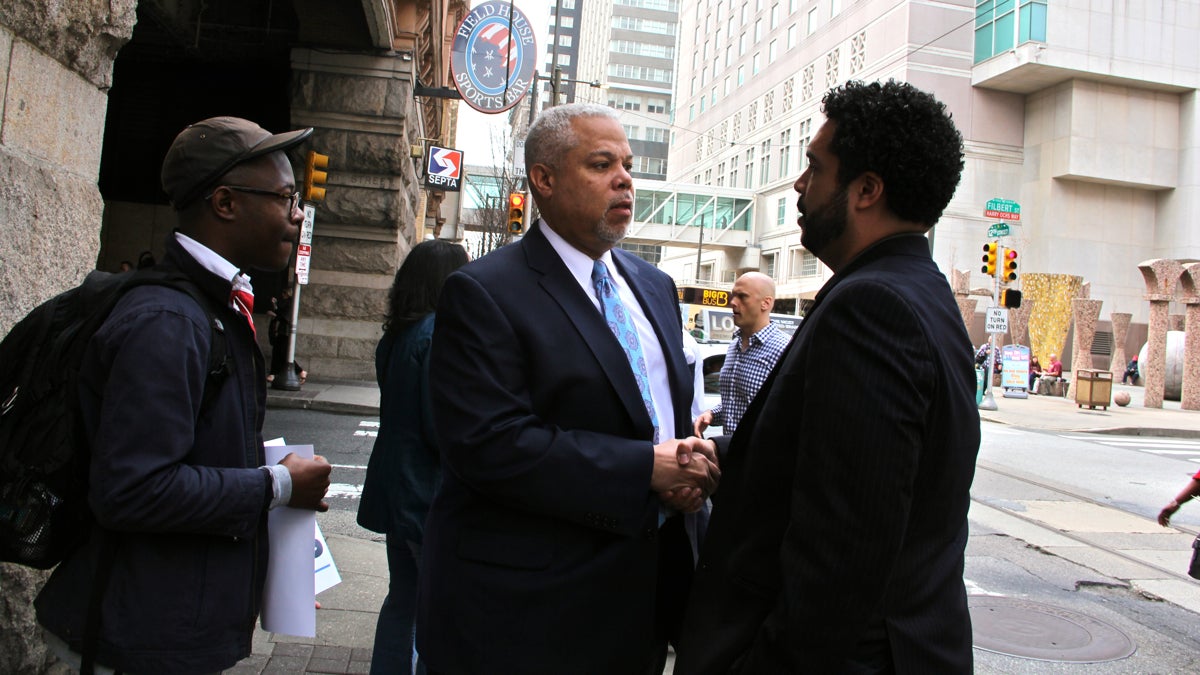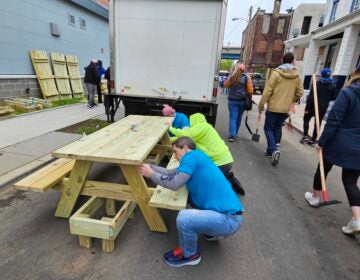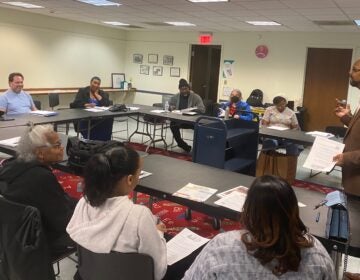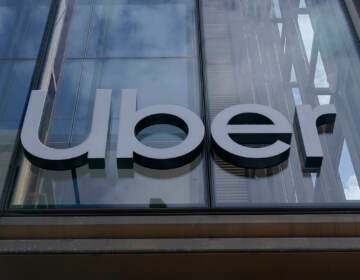Tony Williams talks Carpenters dustup, Kenney endorsement and Dwight Evans

Mayoral candidate Tony Williams talks to campaign spokesman Al Butler outside the Reading Terminal Market on Tuesday. (Emma Lee/WHYY)
Mayoral candidate Tony Williams spent his debate-day lunch break hanging outside the Reading Terminal Market to pitch himself to potential voters. (Check back next week for a photo-gallery akin to the one we ran on Doug Oliver‘s subway campaign efforts.)
In addition to releasing his “Economic Development Plan” (PDF), Williams took a few minutes to talk to NinetyNine about an array of topics at 12th and Filbert sts. on Tuesday afternoon.
They included the Carpenters Union (which endorsed him) trying to steer Democratic leaders away from the Pennsylvania Convention Center during next year’s national convention, and his reaction to both Northwest Philly leaders endorsing his opponent Jim Kenney and George Burrell’s controversial remarks on 6ABC this weekend.
Here’s what he had to say:
What’s your reaction to the Carpenters asking some Democrats to stay away from the Convention Center during the DNC next year? Do these guy have a legitimate beef?
What I’d like to do is offer a way to provide peace. I think all of us recognize that the [Democratic National] Convention is for everybody, them included. It’s important for the city.
To whatever extent I can offer — since we’re not there yet; we have plenty of time — [a way to reconcile] all parties, I’d certainly be happy to do that at the appropriate time.
What steps would you take as mayor?
That wouldn’t be in the public. Very private conversations by everybody that’s affected initially by those that feel they’re affected. I have friends on both areas. Laborers and Carpenters are both friends of mine. So, obviously, we’d have to sit down and have a direct conversation with everybody from that part of the world.
Do you think Carpenters were treated fairly?
I’m not going to offer a comment on fair or not fair because that only further divides the possibility of actually having an event of extraordinary proportions for Philadelphia and everybody celebrating. And that’s what we want to work towards.
With a primarily African American union endorsing Jim Kenney and a primarily white union endorsing you, is there such a thing as racial math anymore?
I think there’s voter math and that encompasses a lot of different proportions. Millennials, seniors, faith, ethnicities: All those factor into the data we’ve compiled.
I do find it kind of curious when I read the newspapers that my only path to victory is through a certain demographic. I think what you’re seeing [as I’m out here campaigning] today is I have broader support than just African Americans.
I think that I have the support that I like to have. From the LGBT community. The Jewish community. Polish community. Armenian community. African American community.
It’s not easy to build consensus. That’s what I do. And, I’m going to stick by ‘One Phladelphia’ [mantra]. I don’t buy into this “only way you can win is the ‘Labor Guy,’ ‘the Black Guy’ or the ‘Law and Order Woman’. That doesn’t really make sense to me. I think Philadelphia is passed that.
What do you think of George Burrell’s comments on 6ABC’s “Inside Edition” and Jim Kenney’s endorsement in Northwest Philadelphia the next day?
I’m assuming he’s talking from the perspective of the history of what [late U.S. Rep.] Bill Gray built.
Bill Gray was another one of those extraordinary leaders who had a base beyond African Americans. I think Mr. Burrell was talking about the [Northwest Philadelphia leaders’ endorsement] process, how it was done. I’m not clear that it represents the working-class families that are in that section of Philadelphia.
My father and Bill Gray built upon people. Not the politics. Not the politicians. They invested in people, and I think that [Burrell] was a bit disappointed that listening to people wasn’t a part of that; it was politics. And I know that he knows [state Rep.] Dwight [Evans] as I do.
I worked in several of Dwight’s campaigns. I think that the non-clarity of what happened and why it happened is what struck him and other people who have called me.
I read in the paper, like everybody else did, that it was ‘stop and frisk.’ I think a number of us [mayoral candidates] are opposed to ‘stop and frisk.’ I’m not quite sure what work, as a city councilperson at large for 20-plus years, Mr. Kenney has done in that area.
When I talk to my family, friends, worship leaders, I’m not sure that there’s anything they point to in the Northwest that Mr. Kenney’s been a part of, in local government.
So, I think Mr. Burrell’s comments reflect some level of frustration about the lack of anything other than it being politics, and politics isn’t enough to generate people and the pride upon which that movement of independence was built, including, certainly, African Americans who were a part of that.
That’s my impression, but I didn’t talk to George about it.
Were you surprised by Dwight going this direction?
No.
Why not?
I have worked closely with him as political ally on a number of issues.
When he became chairman of appropriations [in the state house], I was part of a delegation that actually supported him against another person from Philadelphia.
I was part of a delegation that, when he ran for lieutenant governor, worked for him.
I was part of a delegation that, when he ran for mayor, picked him over other people.
So, I got to see up close the politics that, sometimes, Rep. Evans engages in, so I can’t say I was surprised.
WHYY is your source for fact-based, in-depth journalism and information. As a nonprofit organization, we rely on financial support from readers like you. Please give today.




